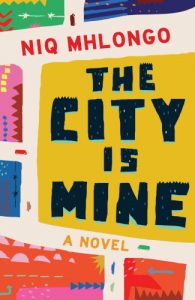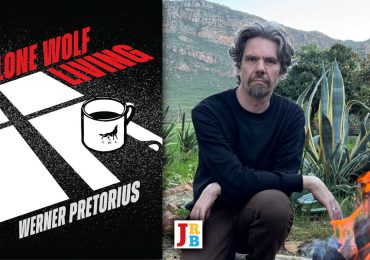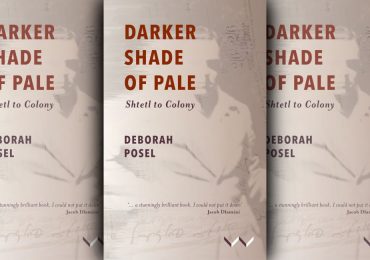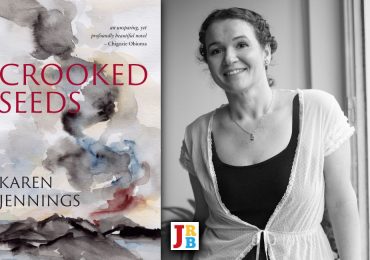Niq Mhlongo chats to JRB Editor Jennifer Malec about his new novel, The City is Mine, and the changes he’s seen in the publishing industry since his debut was published twenty years ago.

The City is Mine
Niq Mhlongo
Kwela Books, 2024
Jennifer Malec for The JRB: Niq, congratulations on your new novel! The City is Mine marks your twenty-year anniversary with Kwela Books, who published your first novel, Dog Eat Dog, in 2004. What comes to your mind when you reflect on your writing career over two decades?
Niq Mhlongo: Hi Jen, and thank you for this opportunity. My writing career has been a fulfilling journey so far. It has not been a bumpy road, despite the fact that my kind of writing was always relegated to the so-called lower class kind of storytelling. I mean, I was always judged by the same yardstick as established white authors like JM Coetzee, André Brink, Nadine Gordimer, and so on. At some point I was said to be a ‘Kwaito generation’ writer and this sometimes came with negative stereotypes, as if I didn’t belong to the ‘writers club’ yet. I had to work hard to build and rebrand myself. But looking at my catalogue and my name on the spines of eleven books today makes me happy. Of course it would have been great if writing yielded some pecuniary benefits, but I’m still satisfied with the opportunities and the profile I have built for myself over the years. My writing career of over two decades is fulfilling.
The JRB: It could be said that Kwela took a chance on you with Dog Eat Dog, as writing by Black authors for a primarily Black readership was seen as a risky business in South Africa at that time. As Fred Khumalo puts it ‘To put it bluntly, white publishers did not know how to sell these stories.’ What changes have you seen in the publishing industry since then?
Niq Mhlongo: There is a lot that has changed. No one would have thought that a white publisher with a Black name like Kwela would one day publish a collection of short stories set in a township, for example. Kwela Books was only ten years old when they published Dog Eat Dog in 2004. By then there were not more than ten Black authors published under them. Look at Kwela Books today, we can count more than thirty Black authors. On top of that, they now have a Black person at the helm of their publishing house. What I mean to say is that publishing in South Africa has been a white space in the past, telling selective ‘white’ stories. They disregarded the majority of Black South Africans, and always dictated what book readers should read. In a nutshell, mainstream publishing houses were not really connected to South African readers. They neglected the local market by publishing stories or books they thought had so-called ‘universal appeal’—themes like African poverty, safari, war, Christianity, and so on. I can say that mainstream publishing followed too many of the US and UK trends and was reluctant to edutain the world through our stories. For example, if your story had the words tokoloshe, witchcraft or village, or contained township slang, that would automatically disqualify you from being published by them. I think my debut novel, Dog Eat Dog, was a game changer in the South African literary landscape in this regard. It was youthful, township set, accessible, and written in what I could call a new lingua franca, with a township feel, away from your mainstream erudite novel language. Things have since changed. Today you can count a number of publishing houses that are Black owned. Look at the great work that BlackBird Books, Paivapo Publishers, Xarra Publishers, Blank Page Books, among others, have been doing. On top of that, we have self-published authors that are telling authentic South African stories. Book clubs organised by Black readers are also playing a role in shaping the reading, writing and publishing world. Publishing houses can no longer decide alone what people can read, write and publish. The changes are huge, the competition is high, and more importantly, we are heading in the right direction.
The JRB: Dog Eat Dog was published internationally, was translated into Spanish, Italian and Burmese, and won the Spanish La Mar de Letras prize. It’s taught at tertiary institutions including Bryn Mawr College, Vanderbilt University and New York University, among others, and in schools in Norway. It was made into radio plays by the BBC and Radio Sweden, and in Norway and Germany. How do you feel about your debut novel, twenty years later?
Niq Mhlongo: This is the book that taught me that it is possible to dream and reach greater heights. It also taught me patience, because these achievements you just mentioned didn’t come all at once. What amazes me is how the book is still considered relevant today. You’ll be surprised to know that of all the eleven books under my name, Dog Eat Dog is still my number one bestseller. After twenty years it is still in print, which is very rare in publishing. Film companies are still optioning it, although nothing concrete has come out of that yet. As we speak, Ohio University Press has just renewed their publishing option in the US. However, it would be a great achievement if it was translated into local South African languages. But there is hope.
The JRB: As you said to Khumalo in a recent interview, after Dog Eat Dog was released you ‘became something like an ambassador of literature and South Africa’, as people overseas wanted to know more about the country. You spend much of your time in Germany and still do a lot of travelling. Do you still feel like a literary diplomat?
Niq Mhlongo: I think every writer is, one way or the other, a literary diplomat, whether travelling or not. We are just underrated. Books travel on our behalf and reach minds, places and spaces for us. They change people’s perspectives and teach us new things. And yes, I still feel like a literary diplomat and I love travelling and learning new things that I can share in my writing.
The JRB: Has your writing process evolved over the years? Are you more efficient? Less efficient? Do you find writing easier, or more difficult?
Niq Mhlongo: At fifty-one I have read a lot of books, travelled many countries, witnessed, observed, dreamt, and experienced life in many ways, which has shaped my writing. All this has made it easier for me to write efficiently, and I have never run out of stories. The challenge sometimes is in selecting which story to tell from the jumbled ideas in my mind, and how to tell those stories in a way that is both exciting and educational to my readers. So yes, I’m more efficient now, but I can’t really say that I find writing easier, because in every story I write I attempt to extend the boundaries of my imagination wider than in the one before. In essence, when I’m writing it’s like I’m taking a round trip to unknown worlds within my head with an anonymous reader who always reminds me to return to the normal.
The JRB: Your new novel, The City is Mine, is a kind of anti-love letter to Johannesburg, ‘the city of broken dreams’. As the main character, Mangi, loses his job and his fiancée, he spirals downward, from comfortable suburban life, to inner-city debauchery and danger, to homelessness and devastation. And all along the way, Joburg is there, with its many faces. What does Joburg mean to you, and what were you trying to evoke with this portrait of the city?
Niq Mhlongo: I think I wanted to tell everyone that there are an infinite number of versions of Joburg realities. The novel delves into my complex personal relationship with Johannesburg, which is my birth city. I wanted to explore my metaphorical love–hate relationship with this city, through the fictional characters of Mangi and Aza’s tumultuous relationship of eight years. As with Mangi’s love for Aza in the book, Joburg is like a lover who plays a game of driving you crazy and wild, while holding onto you with immense affection. And when their relationship becomes toxic, Mangi finds himself homeless on the city streets. Because of crime and poverty, Joburg streets and its sidewalks seem to have grown fangs and claws like those of a vampire, ready to bite and scratch you. Like the irreparable breakdown of Mangi and Aza’s relationship, the city’s soul is stuck somewhere in an ugly, dark place, where even surgical or cosmetic changes are unlikely to heal it or hide its scars.
The JRB: After his car is repossessed, Mangi does a lot of walking in downtown Joburg. In the French literary tradition, the flâneur saunters the streets, observing the city in idle curiosity. As any Joburger knows, you won’t find that here; if people are on two feet in the inner city, it’s because they have no other choice. Was it important for you for Mangi to have that kind physical connection to the city’s historic streets?
Niq Mhlongo: The city walks in the book allowed me to penetrate the city and give detailed descriptions, first tentatively and then more openly on a factual and emotional level. My real, intimate relationship with Joburg city began in 1994, when I was a first year African literature student at Wits University. I was about twenty years old then, and for the first time I was living away from my parents’ house in Soweto. During that time I walked a lot inside the city, and this helped me to connect to it intimately. I remember voting for the first democratically elected government on 27 April 1994 at the Braamfontein civic centre and celebrating wildly when former president Nelson Mandela and his ANC party won the elections. Yeoville was among the most remarkable neighbourhoods in South Africa then. It was a cultural and artistic hub, mirroring a changing city in a country in transition. Yeoville and Hillbrow were the entry points for immigrant communities from across the world. Today, as you correctly point out, it is no longer safe to walk in the city.
The JRB: The characters in The City is Mine are so changeable, they seem to be as erratic and fluid as the city itself. Aza is at once loving and cruel, Mangi is both devoted and deceitful. What is important to you in crafting and writing personalities?
Niq Mhlongo: The City is Mine is about a relationship in a city that has never regained its soul, where the trauma of the past is overwhelmed by the injuries of the present. Looking at the abandoned buildings that have fallen into disrepair today gave me the uneasy feeling of nostalgia that is reflected in this book. Joburg, to me, is like a jilted lover, like the characters of Aza and Mangi. It is a complicated city that will love and hate you in equal measure, at the same time, with the same intensity. As Aza did to her man Mangi in the book, Joburg is that kind of a city that will prise your heart open, insinuating itself into every crevice, creeping up to try to seduce you. All the characters in the book are mirrors of this city that is made up of numerous identities interacting, sometimes harmoniously, sometimes in conflict.
The JRB: When Mangi is at his lowest ebb, he befriends a group of homeless men who live under Smit Street bridge. It is one of these men, Seatbelt, who says ‘I’m the only one here who is from this city. Actually, this city is mine.’ Mangi thinks of him as a man with ‘a streak of stubborn idealism’. What does it take, do you think, to own Johannesburg?
Niq Mhlongo: No one can own this city. Maybe it is safe to say that only people living in the shadows and survivalists can claim that title of ownership. Joburg is the kind of a city that allows anyone to come in and deposit their strangeness, leave, and be replaced by others without any sign of disconnection.
The JRB: Mangi himself can’t cut it in Joburg, and (spoiler alert) ends up leaving for Durban. He remembers his grandfather’s words, ‘A fly that won’t leave a dead body gets buried with it.’ Do you see The City is Mine as a novel of hope or despair?
Niq Mhlongo: I wrote this book as some kind of melancholic nostalgia, a search for a past glory that is long gone. A deep yearning for the past and what Joburg represented to me. I lament the fact that everything good that represents Joburg has shifted and that the attention of city planners is now focused on places like Rosebank and Sandton, leaving the city centre neglected. However, there is a hope for the inner city revival and renewal. It is doable, we just need politicians and economists who are good thinkers.
- Jennifer Malec is the Editor. Follow her on X.






I thoroughly enjoyed delving into Niq Mhlongo’s perceptions of Johannesburg, especially as articulated in his book *The City is Mine* and further explored in this conversation. His reflections on the city offer a nuanced and deeply personal perspective that resonates throughout the narrative. This interview provided me with invaluable insights, enriching my understanding of the book and allowing me to appreciate it more profoundly and multifacetedly.
Through Niq’s words, I now grasp not only how he sees Johannesburg but also how he experiences and emotionally connects with it. This new understanding has illuminated the book for me, allowing me to perceive the layers of complexity and affection in his depiction of Jozi that I might have otherwise overlooked. His ability to weave the personal with the urban, and the historical with the contemporary, offers a rich tapestry of thought that deepens my engagement with both the text and the city it celebrates.